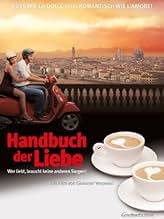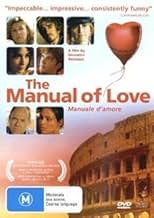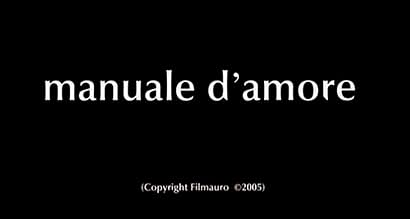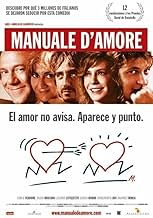AVALIAÇÃO DA IMDb
6,3/10
5,1 mil
SUA AVALIAÇÃO
Adicionar um enredo no seu idiomaFour intertwined episodes on the joys and sorrows of love.Four intertwined episodes on the joys and sorrows of love.Four intertwined episodes on the joys and sorrows of love.
- Direção
- Roteiristas
- Artistas
- Prêmios
- 10 vitórias e 21 indicações no total
- Direção
- Roteiristas
- Elenco e equipe completos
- Produção, bilheteria e muito mais no IMDbPro
Avaliações em destaque
Manual of Love (2005), directed by Giovanni Veronesi, is a charming and heartfelt ensemble comedy that explores the complexities of romantic relationships from various angles. The film is structured around four interconnected stories, each focusing on different stages of love - from the excitement of falling in love to the challenges of maintaining a long-term relationship, and everything in between.
The film's narrative is episodic, with each segment tackling a unique theme, such as infidelity, desire, breakups, and the yearning for companionship. The beauty of Manual of Love lies in its ability to explore these themes with a light touch, blending humor and pathos in a way that feels both accessible and deeply human. Though the storylines vary in tone, they all revolve around the vulnerability and complexity that love inevitably brings, offering both comic relief and emotional depth.
The ensemble cast, featuring a mix of established Italian actors like Carlo Verdone, Robert De Niro (in a small, memorable role), and others, bring the script to life with great chemistry. Each actor portrays a character at a different stage in love, giving the film a sense of universality. Verdone, who also co-wrote the script, shines as the director, balancing the comedic and dramatic elements in a way that makes the film feel both grounded and entertaining.
The cinematography and score complement the tone of the film, evoking the romantic, sometimes bittersweet atmosphere of Italy itself. The lush settings - whether it's a bustling Roman café or a quiet suburban apartment - provide the perfect backdrop for the characters' emotional journeys.
While Manual of Love may not break new ground in its exploration of relationships, it excels in its execution, offering viewers an affectionate, funny, and ultimately optimistic take on love in all its forms. It's a film that understands love's messiness and imperfections and doesn't shy away from portraying it with warmth and sincerity.
Ultimately, Manual of Love is an enjoyable film that captures the essence of romantic relationships in a way that feels both lighthearted and thoughtful. It's a warm reminder of the joys and struggles of love, making it a delightful watch for anyone who's ever been swept up in the whirlwind of romance.
The film's narrative is episodic, with each segment tackling a unique theme, such as infidelity, desire, breakups, and the yearning for companionship. The beauty of Manual of Love lies in its ability to explore these themes with a light touch, blending humor and pathos in a way that feels both accessible and deeply human. Though the storylines vary in tone, they all revolve around the vulnerability and complexity that love inevitably brings, offering both comic relief and emotional depth.
The ensemble cast, featuring a mix of established Italian actors like Carlo Verdone, Robert De Niro (in a small, memorable role), and others, bring the script to life with great chemistry. Each actor portrays a character at a different stage in love, giving the film a sense of universality. Verdone, who also co-wrote the script, shines as the director, balancing the comedic and dramatic elements in a way that makes the film feel both grounded and entertaining.
The cinematography and score complement the tone of the film, evoking the romantic, sometimes bittersweet atmosphere of Italy itself. The lush settings - whether it's a bustling Roman café or a quiet suburban apartment - provide the perfect backdrop for the characters' emotional journeys.
While Manual of Love may not break new ground in its exploration of relationships, it excels in its execution, offering viewers an affectionate, funny, and ultimately optimistic take on love in all its forms. It's a film that understands love's messiness and imperfections and doesn't shy away from portraying it with warmth and sincerity.
Ultimately, Manual of Love is an enjoyable film that captures the essence of romantic relationships in a way that feels both lighthearted and thoughtful. It's a warm reminder of the joys and struggles of love, making it a delightful watch for anyone who's ever been swept up in the whirlwind of romance.
Considering that Italian comedy is kind of limited to 2 or 3 movies during the Christmas holidays,and that some of them are quite good (the ones with Leonardo Pieraccioni and Aldo,Giovanni & Giacomo)and some aren't (the Boldi & De Sica-movies),Manuale d'Amore was a bit of a surprise: released in March 2005,with a quite unknown director(Giovanni Veronesi,better known as a screenwriter,who was also behind Che Ne Sarà di Noi),a famous cast although only two actors were professional comedians (Carlo Verdone and Luciana Littizzetto),and a 4 episode-plot,reminiscent of classic Italian comedies,as well as Verdone's early films.
The story is simple but interesting,as it shows 4 different phases of love: 1.Tommaso (Silvio Muccino) falls desperately in love with Giulia (Jasmine Trinca)and spends the rest of the episode trying to get her; 2.Marco (Sergio Rubini) and Barbara (Margherita Buy) are a married couple in the middle of a crisis,and the whole situation is made funnier by the fact that the two actors were married in real life; 3.Ornella (Luciana Littizzetto) finds out that her husband is unfaithful and swears revenge; 4.Goffredo (Carlo Verdone)is suddenly left by his wife and tries to go on with his life,which won't be easy.
Veronesi tells the story in a very classic way (there are even characters commenting the events straight to camera),without using too much bad language (typical of the mediocre Christmas comedies)or any scenes of graphic nudity.
The cast is excellent: Muccino is one step closer to the stardom he deserves,Trinca,Buy and Rubini should do more comedies,while Littizzetto should do more movies. The real surprise,however,is Verdone,whose mature portrayal of an abandoned husband is miles away from his early,sketch-originated characters.His episode is a perfect mix of comedy and drama,and he deserved every bit of the David di Donatello he won for his performance(Best Actor in a Supporting Role).
So,if you want to watch a good Italian comedy,Manuale d'Amore is recommended.
The story is simple but interesting,as it shows 4 different phases of love: 1.Tommaso (Silvio Muccino) falls desperately in love with Giulia (Jasmine Trinca)and spends the rest of the episode trying to get her; 2.Marco (Sergio Rubini) and Barbara (Margherita Buy) are a married couple in the middle of a crisis,and the whole situation is made funnier by the fact that the two actors were married in real life; 3.Ornella (Luciana Littizzetto) finds out that her husband is unfaithful and swears revenge; 4.Goffredo (Carlo Verdone)is suddenly left by his wife and tries to go on with his life,which won't be easy.
Veronesi tells the story in a very classic way (there are even characters commenting the events straight to camera),without using too much bad language (typical of the mediocre Christmas comedies)or any scenes of graphic nudity.
The cast is excellent: Muccino is one step closer to the stardom he deserves,Trinca,Buy and Rubini should do more comedies,while Littizzetto should do more movies. The real surprise,however,is Verdone,whose mature portrayal of an abandoned husband is miles away from his early,sketch-originated characters.His episode is a perfect mix of comedy and drama,and he deserved every bit of the David di Donatello he won for his performance(Best Actor in a Supporting Role).
So,if you want to watch a good Italian comedy,Manuale d'Amore is recommended.
the funniest scenes are in the second story when the couple having difficulties go to visit relatives who have a new baby. The admiration the baby receives is so exaggerated, the disgust . . . well no point in spoiling it. Most of the audience when I went were young Mexicans who were identifying with the characters in the first story but I didn't get hooked until the second one. The problems with parking guards who give fines, arrange for cars to be hauled off etc was probably funnier to the Italian audience but traveled well across the border. The "moral" of the last story was one I wish I'd learned sooner. All in all a very enjoyable evening's entertainment.
I really enjoyed the first novel. Jasmine Trinca is absolutely sexy and smart there. Although, I would not find Tomasa a perfect match to her, he did played very well.
I am surprised that this movie has not received much of attention of critics and media.
I am big fan of Jasmine after this movie. She is the best! Next novels were not so interesting for me, although I did find amusing one scene about pregnancy and the way everybody watched mother delivering a baby in a hospital.
I would recommend watching Manuale Di Amore to everyone.
I am surprised that this movie has not received much of attention of critics and media.
I am big fan of Jasmine after this movie. She is the best! Next novels were not so interesting for me, although I did find amusing one scene about pregnancy and the way everybody watched mother delivering a baby in a hospital.
I would recommend watching Manuale Di Amore to everyone.
This is a fine Italian comedy that I would recommend to anyone. The movie is about the several steps of love relationships: falling in love, crisis, infidelity, parting. Each of these four steps is represented by a couple: Muccino-Trinca fall in love, Rubino-Buy are on the verge of disaster, Abbrescia is unfaithful to Littizzetto (and vice versa), while Verdone is mad about losing his woman (but will finally fall in love with another one, thus closing the circle).
The feature is structured in almost separate episodes, which is a reference to many "commedie all'italiana" of the '60s. Nevertheless the stories are ingenuously linked among each other and the writing is so skillful that the movie never loses its pace. Plus, it is very well acted. Verdone and Buy are almost perfect, and so is Littizzetto. (This actress became famous thanks to TV shows, but is actually very good and definitely deserves to play a dramatic role to show how credible she is and how versatile).
Verdone proves brave by accepting a character both ridiculous and tragic. He is a physician who has been abandoned by his wife and tries to re-build his life out of its pieces. Maybe the script is a bit excessive here, as it is not clear whether we have to laugh at or identify with him. Anyway he redeems himself in a beautiful ending almost reminding of "La dolce vita"'s.
The episode that I liked the least is the first. It avoids most of the stupid clichés of Italian comedies for teenagers, but why then all those swearwords? They are just annoying and don't add anything to the story and the characters. Plus, the episode is kind of unrealistic.
Obviously, this is not a revolutionary movie, but it is very funny and, most of all, not spoiled by silly character parts as so many Italian movies are.
The feature is structured in almost separate episodes, which is a reference to many "commedie all'italiana" of the '60s. Nevertheless the stories are ingenuously linked among each other and the writing is so skillful that the movie never loses its pace. Plus, it is very well acted. Verdone and Buy are almost perfect, and so is Littizzetto. (This actress became famous thanks to TV shows, but is actually very good and definitely deserves to play a dramatic role to show how credible she is and how versatile).
Verdone proves brave by accepting a character both ridiculous and tragic. He is a physician who has been abandoned by his wife and tries to re-build his life out of its pieces. Maybe the script is a bit excessive here, as it is not clear whether we have to laugh at or identify with him. Anyway he redeems himself in a beautiful ending almost reminding of "La dolce vita"'s.
The episode that I liked the least is the first. It avoids most of the stupid clichés of Italian comedies for teenagers, but why then all those swearwords? They are just annoying and don't add anything to the story and the characters. Plus, the episode is kind of unrealistic.
Obviously, this is not a revolutionary movie, but it is very funny and, most of all, not spoiled by silly character parts as so many Italian movies are.
Você sabia?
- CuriosidadesTodas as entradas contêm spoilers
- ConexõesFollowed by Manuale d'amore 2 (Capitoli successivi) (2007)
Principais escolhas
Faça login para avaliar e ver a lista de recomendações personalizadas
- How long is Manual of Love?Fornecido pela Alexa
Detalhes
Bilheteria
- Faturamento bruto mundial
- US$ 22.281.609
- Tempo de duração1 hora 56 minutos
- Cor
- Mixagem de som
- Proporção
- 1.85 : 1
Contribua para esta página
Sugerir uma alteração ou adicionar conteúdo ausente

Principal brecha
By what name was Manual do Amor (2005) officially released in India in English?
Responda

























